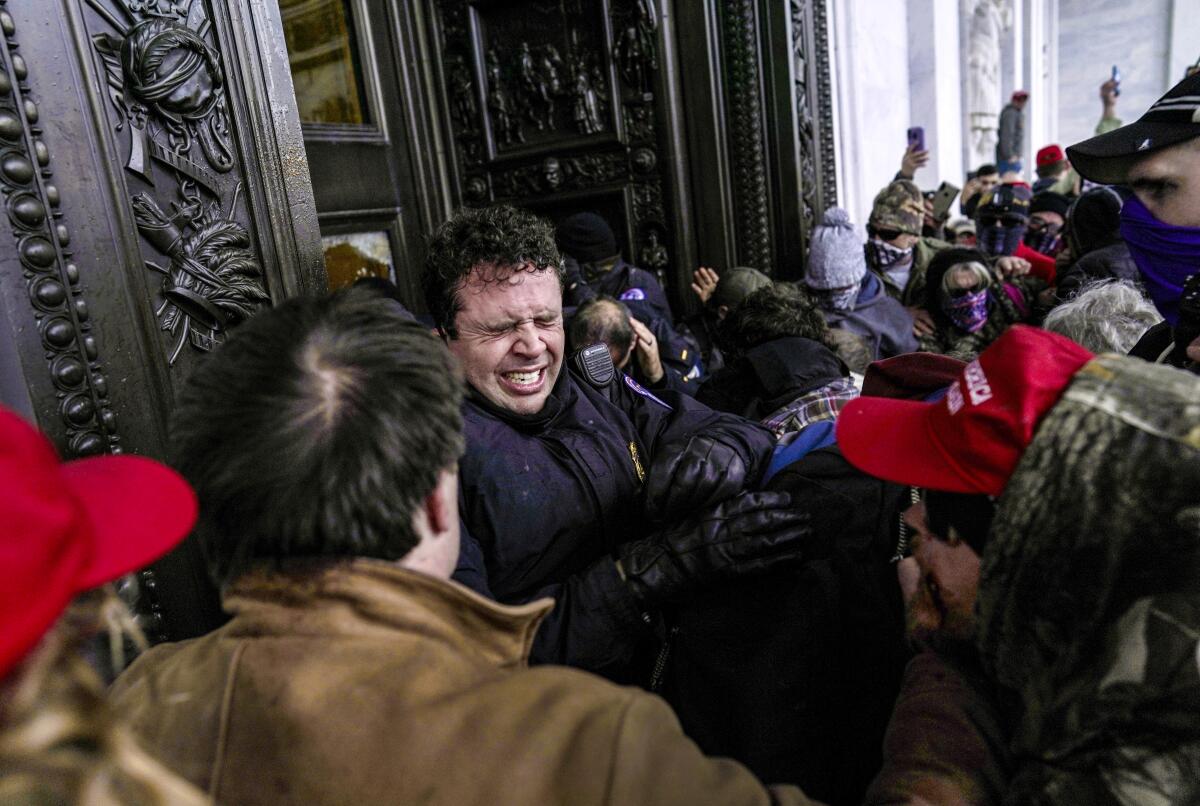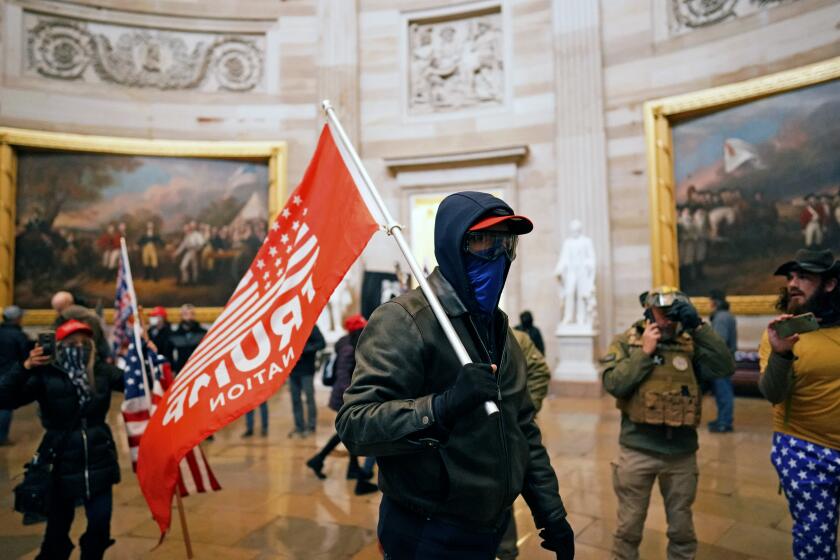House creates committee to investigate Jan. 6 Capitol attack

- Share via
WASHINGTON — The House voted largely along party lines Wednesday to create a special committee to investigate the Jan. 6 attack on the Capitol by supporters of President Trump.
The attack, which occurred while Congress was certifying the 2020 presidential election results, forced Vice President Mike Pence and hundreds of lawmakers to flee. Five people died, and two police officers died by suicide following the violence. At least 140 officers were injured.
For the record:
3:44 p.m. July 14, 2021A previous version of this story said five people were killed during the Jan. 6 attack. Five people died during and shortly after the attack. One person was shot by police and four others, including one police officer, died from natural causes or health complications.
More than 500 people have been arrested on charges including conspiracy and unlawful entry.
“The sheer scale of violence that day was shocking,” said House Speaker Nancy Pelosi (D-San Francisco). “But what is just as shocking is remembering why this violence occurred: to block the certification of an election and the peaceful transfer of power that is the cornerstone of our democracy.”
The House voted 220 to 190 to form the special committee.
Republican leaders had urged their members to vote no on the bill, saying that existing committees have the necessary authority to investigate the attack, and that a new committee would be redundant and a distraction.
Pelosi invited a Capitol Police officer and two Metropolitan Police officers who had been vocal about their experiences in the melee Jan. 6 to watch from inside the chamber as the House debated and voted. She also invited Gladys Sicknick and Sandra Garza, the mother and partner, respectively, of Officer Brian Sicknick, who died after the attack.
Two Republicans, Reps. Adam Kinzinger of Illinois and Liz Cheney of Wyoming, joined Democrats in voting for the committee.
Cheney, in a statement, called the committee “our only remaining option.”
“It is right to be wary of an overtly partisan inquiry,” she said. “But Congress is obligated to conduct a full investigation of the most serious attack on our Capitol since 1814.”
After voting yes, Cheney went to the House gallery to speak with the officers and family in attendance. Several Democrats, including Pelosi, also went to the gallery to meet with them.
Rep. David Valadao (R-Hanford), the only California Republican who voted in favor of an independent commission in May, joined with the other Republicans in the delegation to vote no on Wednesday. Valadao said in a statement that he still thought an independent commission was the best route and that he was worried the investigation would drag on. He said lawmakers who were present during the attack could not be expected to complete an impartial investigation.
“The American people deserve to know the truth about what happened that day,” Valadao said, “and now they will be stuck with soundbites and theatrics. This will only divide us further.”
The vote to create the House committee comes more than a month after a bipartisan attempt to create an independent commission failed to get enough Republican votes in the Senate.
Rep. Mary Gay Scanlon (D-Pa.) pointed out that the earlier bill to create an independent commission was bipartisan and that Democrats had agreed to nearly everything Republicans asked for. “Yet their leadership withdrew their support at the last moment and wouldn’t take yes as an answer,” she said.
The House approved the independent commission bill in May with the support of 35 Republicans. It was negotiated with the permission of House Minority Leader Kevin McCarthy (R-Bakersfield), who then urged GOP colleagues to oppose the final version because it did not include a broader investigation into the violence around Black Lives Matter protests in the summer of 2020 and other matters. Pelosi and Democrats argued that would be too far outside the commission’s purpose. The bill then failed to get the 10 Republican votes needed to begin debate in the Senate.
Pelosi waited several weeks, she said, to see whether Republicans could be swayed before moving to create a House select committee that, unlike the commission, will be made up of members of Congress.
Republicans indicated at the time that they were concerned an independent commission’s investigation would drag into 2022 and interfere with the midterm election. By law, the commission would have had to complete a report by the end of 2021. The House committee created Wednesday has no such deadline to complete its work, which could stretch on for months if witnesses are reluctant to cooperate.
Democrats cast the committee as a move toward a resolution. Republicans cast it as having a predetermined outcome — to lay the blame at Trump’s feet.
Republicans “don’t want to get to the truth,” said Rep. Jim McGovern (D-Mass.). “But we will insist that we get to the truth.”
“Democrats refuse to put together a truly bipartisan commission,” Rep. Michelle Fischbach (R-Minn.) said. “Democrats are injecting partisanship into the investigation.”
The findings of a committee made up of members of Congress could be easier for some to dismiss.
Senate Republicans use the filibuster to block a Jan. 6 commission on the pro-Trump Capitol riot. Here are the questions that may go unanswered as a consequence.
Attention is expected to shift quickly to which members will be tapped to serve on the 13-person committee. The bill allows Pelosi to name the chairperson and eight members, with a Pelosi aide hinting that she may include a Republican in her choices. The other five committee members will be selected “after consultation with” McCarthy, meaning Pelosi could choose to reject them.
Republicans repeatedly took issue with the political balance of the committee, and with Pelosi’s authority to select the members. House rules allow the speaker to appoint all members when creating a select committee.
The partisan makeup of the committee reflects that of the last select committee, created by Republicans when they controlled the House, to study the attack on U.S. facilities in Benghazi, Libya.
Both Pelosi and McCarthy have been silent about whom they will tap for the committee, but Rep. Bennie Thompson (D-Miss.), who leads the House Homeland Security Committee, is the top contender for chairman.
Democrats said this week they were concerned McCarthy would choose Republicans who voted against certifying the election results in January, or who are major backers of the former president. It is not clear whether McCarthy will name Republican members to the committee at all, but conservative firebrands including Reps. Marjorie Taylor Greene of Georgia and Matt Gaetz of Florida have shown interest.
The committee’s chair will have subpoena power, meaning Democrats can compel testimony from former Trump aides as well as lawmakers, including perhaps McCarthy and others who spoke with Trump during the attack.
The Justice Department under Trump routinely declined to enforce Democrats’ subpoenas, but the Biden administration may be more inclined to pursue those who refuse to appear or testify.
To date, investigation of the events that led to several thousand Americans violently seizing control of the U.S. Capitol for several hours has occurred through scattershot congressional hearings and agency watchdog reports. New details continue to become public as the Justice Department prosecutes the hundreds of people accused of participating.
A similar congressional committee investigation preceded the creation of the 9/11 Commission after the 2001 terrorist attacks. Pelosi has said she hopes such an independent commission is possible in the future.
More to Read
Get the L.A. Times Politics newsletter
Deeply reported insights into legislation, politics and policy from Sacramento, Washington and beyond. In your inbox three times per week.
You may occasionally receive promotional content from the Los Angeles Times.












